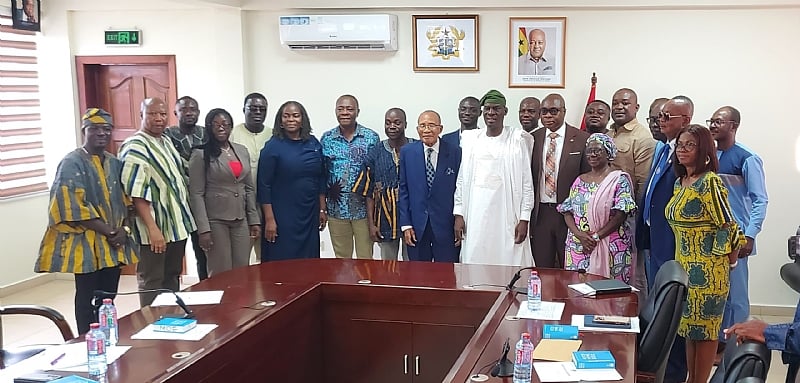The Ghanaian government, under the leadership of Education Minister Haruna Iddrisu, is embarking on a significant initiative to enhance educational inclusivity and accessibility for students with disabilities. The primary focus of this endeavor is the development of a specialized mathematics curriculum tailored to the needs of blind students at the senior high school level. This groundbreaking curriculum aims to bridge the gap that currently prevents visually impaired students from pursuing advanced mathematical studies and accessing careers in the lucrative fields of Science, Technology, Engineering, and Mathematics (STEM). The government envisions a future where no student is left behind, regardless of their physical limitations, and where all have equal opportunities to contribute to the nation’s technological and scientific advancement. This initiative underscores the government’s commitment to fostering a truly inclusive education system that empowers all citizens.
Complementing the mathematics curriculum for the blind is a parallel effort to create a Ghanaian Sign Language curriculum. This initiative aims to provide deaf and hard-of-hearing students with equitable access to education. By developing a standardized curriculum in sign language, the government strives to eliminate communication barriers and ensure that these students can effectively receive instruction and participate fully in the educational process. These two curriculum development initiatives are tangible manifestations of the government’s broader commitment to promoting inclusivity and ensuring that all Ghanaian students have equal opportunities to reach their full potential, regardless of their physical challenges.
The launch of these initiatives coincided with the inauguration of a new 19-member Governing Council for the Ghana Education Service (GES). Minister Iddrisu, during the inauguration ceremony, administered the oaths of office and secrecy to the council members, emphasizing their crucial role in not merely managing policies, but transforming lives. He underscored the importance of developing a globally competitive human resource base for Ghana. This council, according to the Minister, bears the responsibility of shaping Ghana’s education system into a dynamic force that nurtures talent and empowers citizens to compete effectively on the global stage. The emphasis is on developing human capital that can drive national development and contribute to the global knowledge economy.
One of the key mandates given to the newly appointed GES Governing Council is the development of Ghana’s first-ever digital education policy, slated for completion by 2026. This digital policy will provide a comprehensive framework for integrating Information and Communication Technology (ICT) into all levels of education, from kindergarten to senior high school. The Minister stressed the importance of mainstreaming ICT to equip students with the essential digital literacy skills needed to thrive in the 21st-century workforce. This forward-looking approach recognizes the transformative potential of technology in education and aims to position Ghana at the forefront of digital learning. By providing students with the necessary digital tools and skills, the government is investing in the future of the nation and preparing its citizens for the demands of the global digital landscape.
Beyond curriculum development and digital integration, Minister Iddrisu tasked the GES Council with addressing critical issues within the education system, particularly student safety and discipline. Expressing concern over recent reports of indiscipline in schools, he urged the council to strengthen inspection mechanisms and enforce stricter disciplinary measures to ensure a safe and conducive learning environment for all students. The Minister emphasized that safety is paramount and that proactive steps must be taken to safeguard students’ well-being. He also highlighted food quality as an area of concern, advocating for immediate improvements in the nutritional value and overall quality of meals provided to students. This holistic approach to education recognizes that student well-being extends beyond academics and encompasses physical and emotional safety, as well as proper nutrition, all crucial factors for optimal learning and development.
Minister Iddrisu also addressed the issue of teacher quality and assessment, noting that the government has established a committee to review the teacher licensing examination. The goal, he explained, is to ensure that the examination effectively assesses teacher competency without compromising quality standards. This commitment to enhancing teacher quality reflects the understanding that skilled and well-trained educators are the cornerstone of a robust education system. Furthermore, the government is committed to investing in educational infrastructure to end the double-track system, a measure implemented to address overcrowding in schools. This investment will create more classroom space and improve the overall learning environment, ultimately benefiting both students and teachers. The Minister further called for increased coordination with the West African Examination Council (WAEC) to establish a unified calendar for the Basic Education Certificate Examination (BECE), streamlining the examination process and reducing potential scheduling conflicts. This demonstrates a collaborative approach to educational reform, involving key stakeholders to improve efficiency and consistency within the system.
Prof. Mawutor Avoke, the Chairman of the GES Governing Council, expressed gratitude for the trust placed in the newly formed council. He and the other members pledged to fulfill their mandate diligently, working tirelessly to reshape Ghana’s education system and equip it to meet the challenges of the 21st century. The council comprises representatives from various educational institutions and organizations, including WAEC, the National Schools Inspectorate Authority, the National Teaching Council, the National Council for Curriculum and Assessment, and teacher associations. This diverse representation ensures a holistic and comprehensive approach to educational policy and reform, drawing on expertise from various sectors. Simultaneously, the Minister also inaugurated a 10-member Governing Council for the University of Education, Winneba, chaired by retired Justice Jacob Charles Amonoo-Monney, further demonstrating the government’s commitment to strengthening governance and leadership within educational institutions at all levels. These initiatives collectively demonstrate a proactive and comprehensive approach to educational reform, aiming to create an inclusive, technologically advanced, and high-quality education system that serves the needs of all Ghanaian students and prepares them for success in the global arena.














